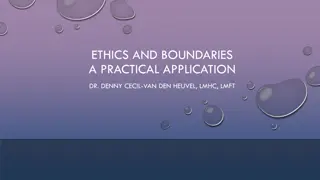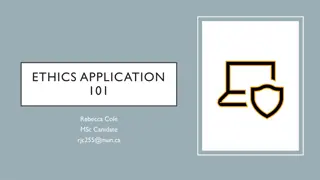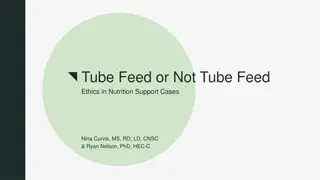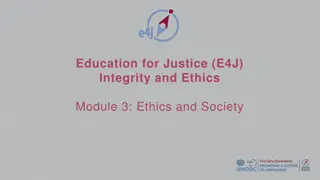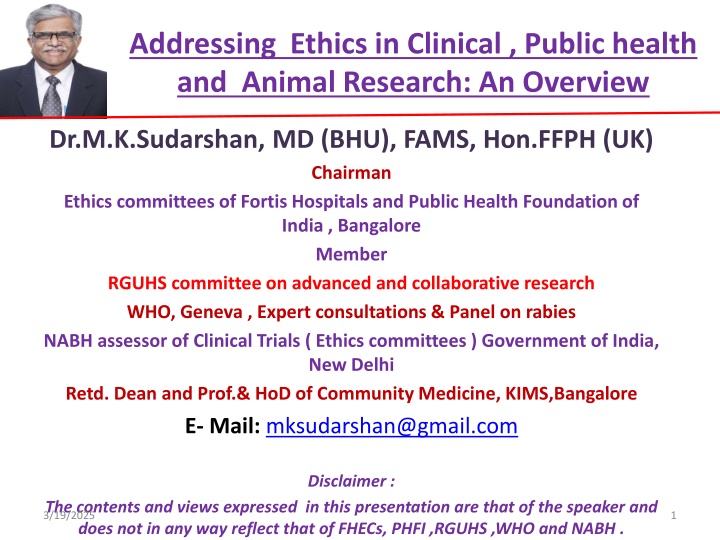
Ethical Considerations in Clinical, Public Health, and Animal Research Overview by Dr. M.K. Sudarshan
Delve into the ethical principles guiding research in clinical, public health, and animal settings as outlined by Dr. M.K. Sudarshan, covering vital topics such as autonomy, beneficence, non-maleficence, and justice. Discover the key pillars and general principles of ethical human research, along with insights into clinical trials and the role of Institutional Ethics Committees in safeguarding participants' rights and well-being.
Download Presentation

Please find below an Image/Link to download the presentation.
The content on the website is provided AS IS for your information and personal use only. It may not be sold, licensed, or shared on other websites without obtaining consent from the author. If you encounter any issues during the download, it is possible that the publisher has removed the file from their server.
You are allowed to download the files provided on this website for personal or commercial use, subject to the condition that they are used lawfully. All files are the property of their respective owners.
The content on the website is provided AS IS for your information and personal use only. It may not be sold, licensed, or shared on other websites without obtaining consent from the author.
E N D
Presentation Transcript
Addressing Ethics in Clinical , Public health and Animal Research: An Overview Dr.M.K.Sudarshan, MD (BHU), FAMS, Hon.FFPH (UK) Chairman Ethics committees of Fortis Hospitals and Public Health Foundation of India , Bangalore Member RGUHS committee on advanced and collaborative research WHO, Geneva , Expert consultations & Panel on rabies NABH assessor of Clinical Trials ( Ethics committees ) Government of India, New Delhi Retd. Dean and Prof.& HoD of Community Medicine, KIMS,Bangalore E- Mail: mksudarshan@gmail.com Disclaimer : The contents and views expressed in this presentation are that of the speaker and does not in any way reflect that of FHECs, PHFI ,RGUHS ,WHO and NABH . 3/19/2025 1
Health / Medical Research Broadly categorized as follows - Clinical Research Hospital settings Public Health Research Community /Population settings Animal Research Laboratories Ethics : i.Ethics or moral philosophy is a branch of philosophy that involves systematizing, defending, and recommending concepts of right and wrong conduct. ii. Moral principles that govern a person's behaviour or the conducting of an activity. Four cardinal principles of ethical research 1. Autonomy : Respect for persons [to subjects] 2. Beneficence : Maximize the benefits [to subjects] 3. Non-malfeasance : Avoid harm [to subjects] 4. Justice : Fairness in selection [of subjects] Four pillars of ethical research 1. Principal Investigator 2. Ethics committee ( internal regulator ) 3. Institution 4. Regulator/Controller ( DCGI or DHR -external regulator ) 3/19/2025 2
GENERAL PRINCIPLES OF ETHICS OF HUMAN RESEARCH 1. ESSENTIALITY is this research on humans needed ? 2. VOLUNTARINESS is participation of the subject voluntary ? 3. NON-EXPLOITATION Not harmful to the subjects ? 4. SOCIAL RESPONSIBILITY Social harmony is safeguarded 5. PRIVACY AND CONFIDENTIALITY Identity kept secret / information access, use, etc 6. RISK MINIMINSATION to subjects is ensued throughout the study 7. MAXIMIZATION OF THE BENEFIT to subjects , society and science 8. PROFESSIONAL COMPETENCE PI / CO- PI / IEC 9. INSTITUTIONAL ARRANGEMENTS FACILITIES, PATIENT CHARTER, ETC. 10. TRANSPARENCY AND ACCOUNTABILITY COI OF IEC, PI , information on websites, CTRI, record storage, archival, retrieval, etc. 11. TOTALITY OF RESPONSIBILITY of all stake holders through law , etc. 3/19/2025 3 12. ENVIRONMENTAL PROTECTION by PI , IEC, etc.
I. Clinical Research [ clinical trials ] : Clinical research is a branch of medical science that determines the safety and effectiveness (efficacy) of medications, devices, diagnostic products and treatment regimens intended for human use. These may be used for prevention, treatment, diagnosis or for relieving symptoms of a disease. Institutional ethics committee [IEC] : a) Shall protect the rights , safety and well being of the study participants /subjects. b) Shall ensure that universal ethical values and international scientific standards are maintained. c) Shall assist in the development and education of a research community responsive to local health care requirements. 3/19/2025 4
II. Composition of institutional ethics committee [IEC] : [ 7-15 members ] [ Quorum is 5 * or 7 members* depending on type of IEC ] 1. Chairperson ( external / non-affiliate person ) 2. One to two basic medical scientists* (one medical pharmacologist and one preferably from Dravyaguna / Rasshastra / Bhaishajya Kalpana or Gunapadam or Ilm-ul advia/Taklis-Wa-Dawa-Sazi). 3. Two clinicians* from various Institutes, one out of which should be from respective system 4. One legal expert* or retired judge 5. One social scientist* / representative of non-governmental voluntary agency 6. One philosopher / ethicist / theologian 7. One lay person* from the community ( external / non-affiliate ) 8. Member Secretary( internal / affiliate ) 9. One expert member of ASU Note: a. Subject experts may be invited when needed, but they will have no voting rights. b. It is recommended to have a consensus approval of the research proposals Reference : Government of India. GCP Guidelines for clinical trials in Ayush, March,2013 3/19/2025 5
i. IEC shall be established under an institution. ii. Under the New Drugs and CT rules, 2019, IEC shall be registered with the Central Drugs Standard Control Organization (CDSCO) for clinical trials(CTs) or Department of Health Research, Govt. of India , New Delhi for biomedical and health research ( academic studies ) iii. SOPs of the IECs are now essential. iv. The IEC approval of the research proposal shall be given on IEC letterhead duly signed by the member secretary and with a period of its validity. v. Registration (online) of the clinical trials is mandatory on the website clinical trials registry India [CTR-I]. From April , 2018, 1st participant enrolment shall be done only after CTRI number . 3/19/2025 6
II. Public Health [Epidemiological] Research and ethical actions.: There are broadly two types of studies: Observational studies : 1. Population Surveys( cross sectional) : one time contact ; informed consent would suffice. 2. Case control studies : Informed consent(IC) if subjects are in contact with the PI or if using records only waiver of IC by an institutional ethics committee [IEC] 3. Cohort studies : Informed consent of both exposed/affected and control groups needed Interventional studies : 4. Community trials: use of Iodized salt, mass vitamin A prophylaxis, IFA supplementation in pregnant women and school children, DOTs therapy in TB, Mass DEC in Filariasis, etc 3/19/2025 7
Specific ethical actions: a) Community consent: Through village leaders, panchayat leaders is essential b) Informed consent: of the individuals is crucial. c) Avoid societal or peer pressures: Individuals may be compelled to fall in line despite reluctance/discomfort d) No inducements: like giving money for informants, participants beyond loss of wages, conveyance, etc. e) Privacy: Screening for ca cx; etc. f ) Confidentiality of data needs to be maintained 3/19/2025 8
Ethical approval of bio-medical health research studies: From September, 2019 a separate institutional ethics committee registered with Department of Health Research, Government of India, New Delhi shall give approval for biomedical and health research studies ( for other than regulatory clinical trials ) III. Animal Research: For experimentations on small animals like Mice,Rats,Guinepigs & Rabbits, Committee for the purpose of control and supervision of experiments on animals [ CPCSEA ] : Ministry of Environment, GOI, is the regulatory agency Institutional Animal Ethics Committee [ IAEC] IAEC shall consist of 5 (Five) persons (all from science background including one Veterinarian) A Biological Scientist Two Scientists from different biological disciplines A Veterinarian involved in the care of Animals Scientist In-Charge of Animal House Facility 3/19/2025 9
The Chairman of the Committee preferably Head of the Institution / Department and Member Secretary would be nominated by the establishment from the above five IAEC members. Other members of the IAEC like Main Nominee, Link Nominee, Scientist from outside the Institute and Non Scientific Socially Aware Member will be nominated by CPCSEA on receipt of the above composition of IAEC for the establishment. CPCSEA Requirements: 1. For online services of Registration Renewal Reconstitution of IAEC; Establishing and maintenance of an animal house - guidelines: Visit the website - http://cpcsea.nic.in. 2. mandatory (letter/certificate the chairman validity ) is compulsory. For any experimentation IAEC on & CPCSEA on small animals of and IAEC research the the approval is approval/clearance the IAEC nominee the with proposal letterhead signatures period of its stating of 3/19/2025 10
Thank you for your kind attention 3/19/2025 11

